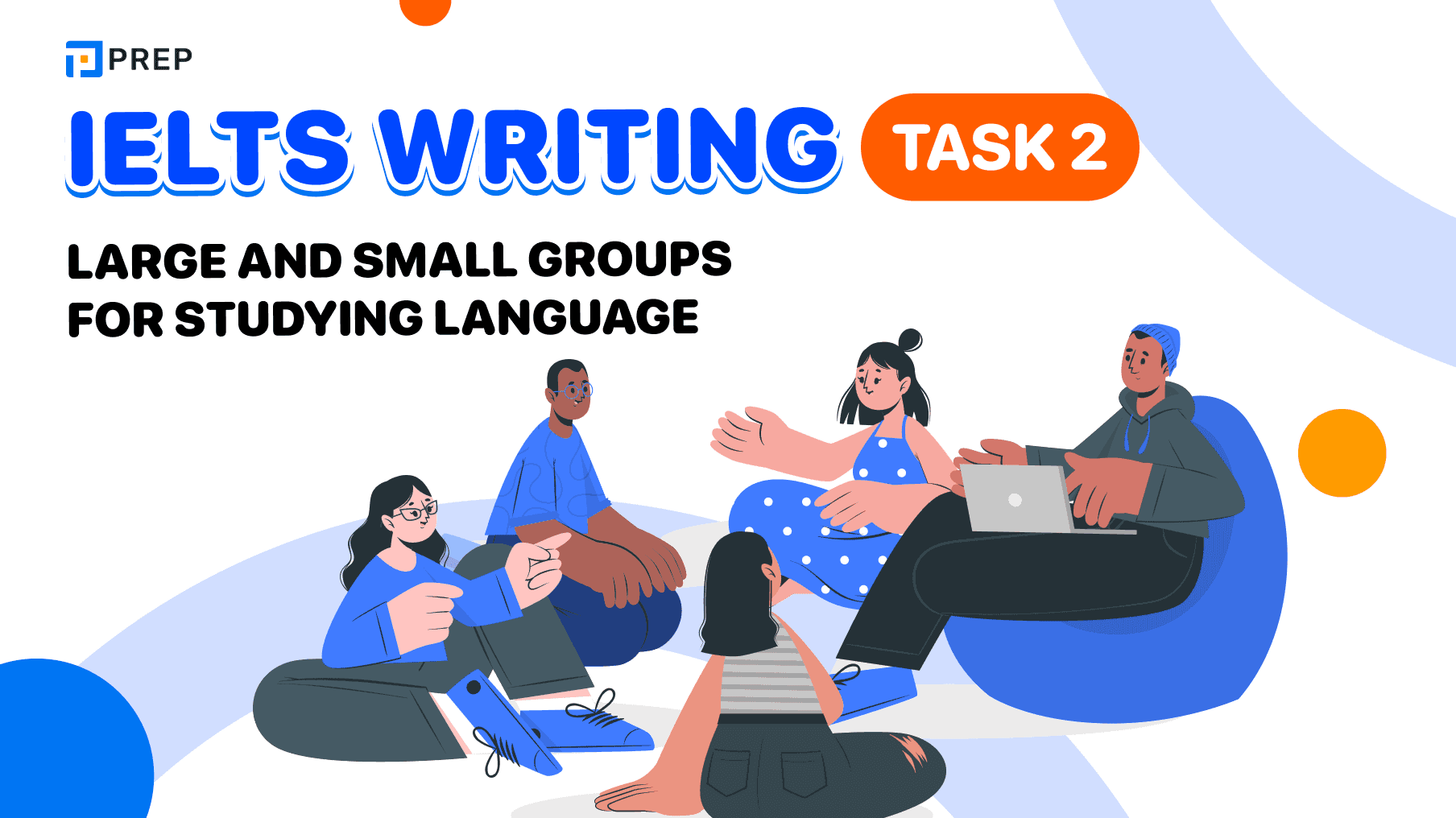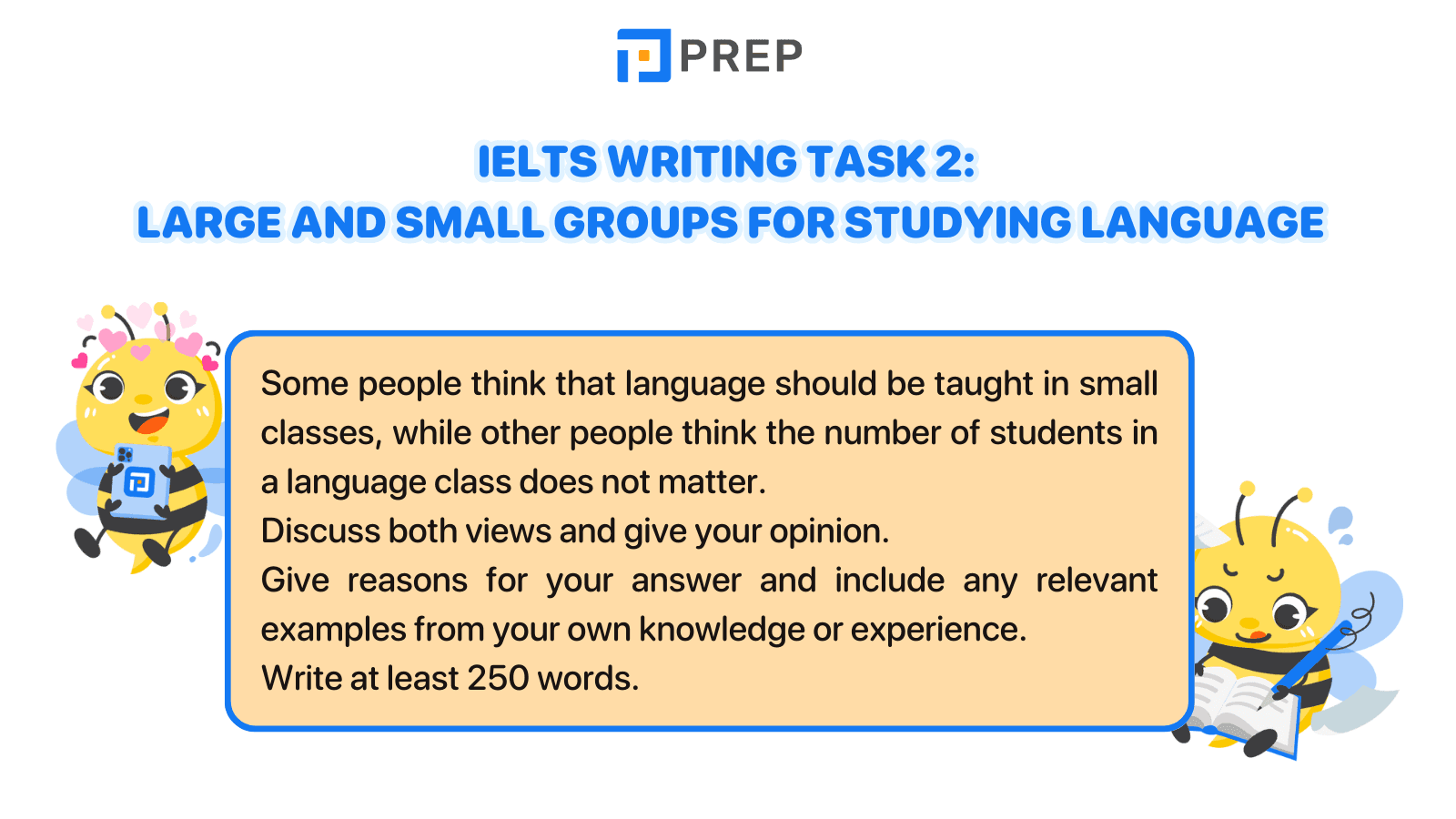Sample IELTS Writing Task 2 Large and small groups for studying language
"Studying language - Learning foreign languages" is an extremely "hot" topic that frequently appears in the IELTS Writing Task 2 exam. In today's article, PREP would like to share with you the prompt, outline, and a sample IELTS Writing Task 2 Large and small groups for studying language at band 7+ level. Take a look right away!
*This sample was prepared by Mr. Nhat Pham, an IELTS 8.5 Overall achiever (9.0 Listening, 9.0 Reading, 8.0 Writing, 7.5 Speaking) and Marker Leader at PREP.

I. The task and outline for IELTS Writing Task 2 Large and small groups for studying language
Before exploring the sample IELTS Writing Task 2 Large and small groups for studying language, let's quickly go through the prompt and the detailed outline below, shall we?
1. Task
You should spend about 40 minutes on this task.
Write about the following topic:
Some people think that language should be taught in small classes, while other people think the number of students in a language class does not matter.
Discuss both views and give your opinion.
Give reasons for your answer and include any relevant examples from your own knowledge or experience.
Write at least 250 words.

2. Outline for IELTS Writing Task 2
Let's quickly take a look at the detailed outline for IELTS Writing Task 2 Large and small groups for studying language:
|
Introduction |
|
|
Why the number of students in a language class may not matter |
|
|
Why language should be taught in small classes |
|
|
Conclusion & Opinion |
|
II. Sample IELTS Writing Task 2 Large and small groups for studying language

After going through the prompt and outline, let's quickly take a look at the high-quality sample essay for IELTS Writing Task 2 Large and small groups for studying language below, shall we?
Language teaching has long been a subject of debate, particularly with respect to the class size. While some pundits claim that the number of students present has negligible impact on the learning process, I am convinced otherwise, as more compact classrooms would lead to improved outcomes for learners.
On the one hand, several reasons exist to believe that the size of a language class is not detrimental to learning. Firstly, in a large classroom, multiple attendants can learn a new language at the same time, creating positive collective learning experiences. This happens as a result of students being able to form groups and exchange ideas with each other. Using technological tools, moreover, language teachers can dispense knowledge regardless of class size. Various digital platforms, such as Zoom, facilitate real-time communication and provide instant feedback, thereby eliminating the physical barriers between teachers and students. Certain studies have proved that technology-equipped classes produce improved language learning outcomes no matter how many students are present.
However, there are significant benefits that are exclusive to smaller classrooms regarding language learning. In any discipline, including linguistics, by having a limited number of students, teachers are able to provide more attention to individual attendants, which allows learners to obtain information more efficiently. A classroom of 10 students, for instance, is likely to experience a better knowledge retention rate in a 2-hour session compared to a classroom of 50. Furthermore, as class size decreases, attendants receive a more tailored and engaging approach to language education. As learning capability varies from student to student, if the classroom is sufficiently large, teachers will likely have to cater to the needs of the weaker-performing group by slowing the pace, which leaves them unable to maintain the interest of those who can grasp concepts rapidly.
In conclusion, despite the availability of advanced technology for language education, class size remains a consequential factor in ensuring effective outcomes. Small classrooms matter even though they are not the sole reason for successful language learning, because they can keep students engaged and facilitate efficient knowledge reception.
Vocabulary used in the sample essay for IELTS Writing Task 2 Large and small groups for studying language:
-
Negligible (adj.): insignificant, trivial
-
Otherwise (adv.): on the other hand
-
Compact (adj.): small and neatly arranged
-
Outcome (n.): result
-
Detrimental to sth (adj.): harmful to something
-
Attendant (n.): participant
-
Collective (adj.): group-based
-
Dispense sth (v.): distribute something
-
Instant feedback (n.): immediate response
-
Nutritive (adj.): nourishing
-
Exclusive to sth (v.): only found in something
-
Discipline (n.): subject area
-
Retention (n.): keeping, preserving
-
Tailored (adj.): customized, personalized
-
Engaging (adj.): captivating
-
Cater to sth (v.): serve the needs of something
-
Pace (n.): speed, rhythm
-
Grasp sth (v.): understand something
-
Concept (n.): idea
-
Consequential (adj.): important, significant
-
Sole (adj.): only, unique
Hopefully, after reading the above article, you have a good understanding of the specific prompt, a detailed outline, and the best sample IELTS Writing Task 2 Large and small groups for studying language. Keep following PREP to get updated on useful English knowledge!
PREP is the only platform offering a comprehensive Writing evaluation process powered by AI technology. The system automatically detects and corrects errors in vocabulary and grammar while identifying critical mistakes that could lower your exam score. Using an exclusive scoring system with 4 main criteria and 11 sub-criteria, it helps you pinpoint common errors, analyze them, and provides detailed solutions in an easy-to-follow interface.
In addition to identifying mistakes, the system highlights your strengths in vocabulary, grammar structures, and ideas, helping you enhance these in future exams. It also offers tailored suggestions to address weaker areas, allowing you to improve step by step and effectively boost your band score.
Download the PREP app now to study IELTS at home and experience a high-quality online preparation program designed to help you achieve your target scores.

Hi I'm Chloe, and I am currently serving as an Product Content Administrator at Prep Education. With over five years of experience in independent online IELTS study and exam preparation, I am confident in my ability to support learners in achieving their highest possible scores.
Comment
Premium content
View allPersonalized roadmap
Most read












